

ARC Forum on Faith - Archive 2021


ARC Forum on Faith - Archive 2021
SITE INDEX
Top of Page
The pictures found on this "Forum on Faith" page were either found published
on a web site or provided by the author. If authors prefer to supply a picture instead of the one used,
please send it as an attachment to donlav@eternal-now.org. 
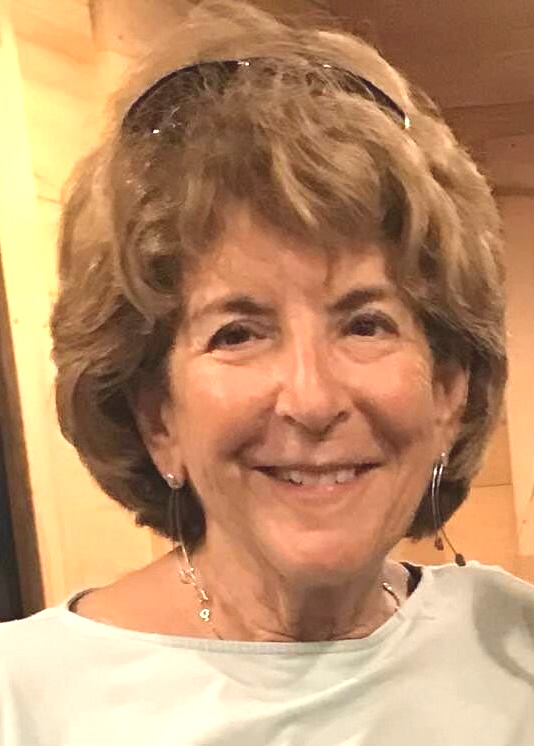
Marge Davidson
FORUM ON FAITH
How faith gets us through the hard times.
by Marge Davidson
Published: December 18, 2021
Danbury News Times
This column is usually written by faith leaders of our community. I do not fall into that esteemed category, not by a long shot. Rather, I am a non-observant person raised in the Jewish tradition, and a member of a family that embraces Christianity, Muslim traditions, a wide variety of Judaism, and devout atheism.
I struggle with the meaning of faith. Is it an adherence to a particular religious belief? Is faith an observance of traditions? Is faith a belief in God? In science? In the basic goodness of humanity? In nature?
At our recent Thanksgiving gathering, I asked my family to give me their definitions of faith. Their answers were as varied as their personalities. For one, faith is a trust in humankind. For another (our family's gymnast), it is confidence that her hard work and training will keep her from injury. One has faith in the meaning of Christmas. One has a belief that the Red Sox will win the series. Another has faith that vaccines will work. Is there a common thread?
On my iPhone calendar, I have set three quotes to show up on the first day of every month. Each is a lesson and a reminder to keep spirits up. The first is from basketball coach John Wooden: "Things work out best for those who make the best of the way things work out." It is saying that we have control over our own thoughts and actions; we can decide how to face life and even how to make the best of a bad situation. It is a call for optimism while facing reality. In other words, have faith.
From Albert Einstein: "Learn from yesterday, live for today, hope for tomorrow." Here is how I interpret this quote. Yesterday: Learn from the past but don't keep looking in the rear-view mirror. Don't dwell on adversity, move on. We cannot change what has already happened. Today: Each day is a precious gift in a finite lifetime. Do something positive for yourself or others. Make the day worthwhile. Tomorrow: Dare to dream, plan that trip, support medical research, and cherish the children. In other words, have faith.
The third monthly quote is from Winston Churchill: "Never, never, never give up. "Churchill was addressing war-torn Britain, yet the words resonate today. He encourages us to face realities with fortitude, determination, and courage. No matter how large the challenge we face, keep at it. Never give up. Have faith.
Like so many others, our family faces the hard side of life. We deal with leukemia, Alzheimer's, autism, aging, depression, Covid, mental illness, and more. I myself was diagnosed with breast cancer last year. Several years ago I had a compound fracture in my leg and faced multiple surgeries. I never had a doubt that I would make a full recovery. Why? Faith.
Margo Davidson
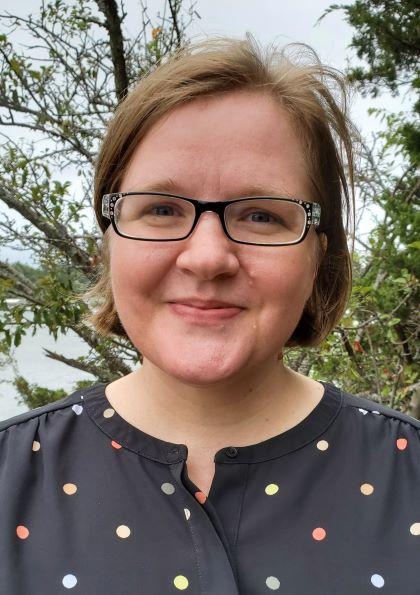
Rev. Sierra Gerfao
FORUM ON FAITH
Through old stories, we remember and learn..
by Rev. Sierra-Marie Gerfao
Published: December 4, 2021
Danbury News Times
My family is in mourning for my mother-in-law, whose death came at the end of November. As people in mourning often do, we have found ourselves telling stories, recalling memories of our beloved deceased.
There is a video clip that has been making the rounds recently on social media, in which actor Andrew Garfield tells Late Show host Stephen Colbert that grief is love we have not been able to express. Garfield thanks Colbert for asking about Garfield's mother. "I love talking about her," Garfield says.
Indeed, my family will be expressing our love for my mother-in-law for years to come, by telling stories about who she was and the varied ways she shared her love with us. We love talking about her. But while family stories are some of the most frequently repeated stories, we repeat stories of all types, over and over.
The instinct to retell stories is so natural and common a human experience that it begins when we are babies, taking pleasure in books that are repeatedly shared with us. Toddlers often seek the same books again and again, even asking for stories to be read to them multiple times in a row. As they get older, many children act out variations of the same stories in their play.
We repeat stories from our lives for a variety of reasons. For example, we use repetitive storytelling to process experiences and organize and integrate new information, but we also use repetitive storytelling to gain different insights from different friends.
Similarly, in faith communities, the repetition of particular stories serves various purposes. For example, we may tell stories to teach, to remember or commemorate, or to regularly refocus our attention.
Jewish people currently celebrating Hanukkah may be sharing the story of the rededication of the temple in Jerusalem. Christian people celebrating Advent at this time may be talking about the road to Bethlehem. The stories get repeated every year. (In my own religious community, Unitarian Universalism, we come together not by way of shared beliefs, but moreso by way of shared values and commitments, so there are people who tell each of these stories, and people who tell other stories as well.)
Just as naturally as it is for many of us to repeat stories, however, so too is it natural and common to lose interest in often-repeated stories. We may find our mind drifting when a friend or relative unintentionally repeats a story they have told us a time or two before. We may find ourselves tempted to rush through the telling of a religious story that feels all too familiar.
When we rush through the telling of the stories our communities have selected for regular retelling, when we reserve the repetition of stories solely for the education of children, and when we consistently favor first encounters with new stories over the experience of hearing old stories again, however, something is lost. Aside from losing layers of meaning that occur when we encounter the same stories at different points in our lives, we lose the opportunity to be changed by the stories over time.
Even stories we don't like are instructive and have layers of meaning that reveal new things to us when we tolerate them long enough to sit with or wrestle them. We sometimes repeat stories because wrestling with them is necessary or right.
Some of the stories my family tells about my mother-in-law are ridiculous and silly, some are treasured for their sweetness, some are powerful and poignant, and a few are painful and upsetting. We will pass a variety of them down to younger generations.
We tell these stories again and again as if they will reveal something about who we are, as a family, as much as who my mother-in-law was during her life. Over time, such stories begin to affirm in us those qualities and beliefs that they highlight, reinforcing the presence of these qualities and beliefs in our lives. They offer a sense of connection that slowly transforms our relationship with the family.
As natural as it is to retell old stories, most of us do it. Maybe the question isn't, "why keep repeating the same old stories," but "which stories are worthy of sitting with or wrestling, and which stories deserve to be known by heart?" Religious communities have the benefit of hundreds or thousands of years of discernment about the retelling of old stories. How might we remain open-hearted toward what these special stories have to offer us?
The Rev. Sierra-Marie Gerfao is the director of religious education at the Unitarian Universalist Congregation of Danbury, at 24 Clapboard Ridge Road, Danbury, CT 06811. She can be contacted at dre@uudanbury.org, or 781-605-8772.
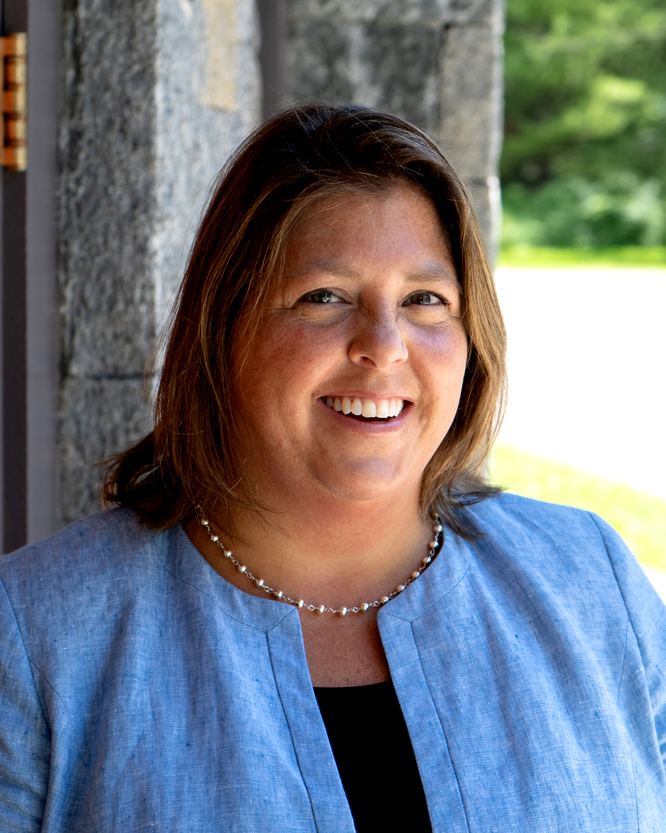
Rev. Beth Anderson
FORUM ON FAITH
Out of a Ridgefield church, volunteers provide food to those in need.
by Rev. Beth Anderson
Published: November 20, 2021
Danbury News Times
"I wake up the third Friday of the month excited for the day because I know that I'm going to the church to volunteer with the mobile food pantry," Jim explained to me. Retirement has given Jim the flexibility to do more service in the community. An active member of St. Andrew's Lutheran Church, Jim's heart for serving the community stems out of his life- long faith in God who loves unconditionally. Love is action. Jim's response to God's love is to do all he can to let others know God's love for them as well.
The CT Mobile Food Pantry comes to our church parking lot every month due to the generosity of an anonymous donor in town. St. Andrew';s provides the space for receiving and distributing the food. Each month a few church members offer hospitality to the volunteers and consumers. Ridgefield department of Social Services organizes the entire effort with volunteers from church/synagogue, service club, scouts, or through their own relationship with Social Services. We are grateful for this collaboration to help meet the needs of our neighbors.
Our church volunteers adore welcoming visitors to the pantry each month. Oftentimes we see the same volunteers and consumers each month, enabling friendships to develop. Some folks come with their children still too young to attend school. We love seeing the little ones. Truly, our volunteers are delighted to meet all who come to the food pantry to distribute and pick up food.
Barely able to get the words out quick enough, Jim expressed his own joy in making new friends and running into old friends while volunteering with the mobile food pantry. These days are more than an exchange of goods, a tally of volunteer hours, or a note of charitable giving. They are days of building community. An otherwise empty parking lot comes alive with welcome, friendly conversation, the sharing of recipes in response to the food items available that day, and moments of looking a stranger in the eye with words of welcome and honor. "It feels like we are part of family working together," Jim reflected on his experience.
Beginning in 2012 to serve Ridgefield and its neighbors, the mobile food pantry started in a parking lot on Halpin Lane near many affordable housing units. Quickly outgrowing the space, it moved to St. Andrew's in 2014, serving over 200 households. During the pandemic, numbers have dropped to about 120 households picking up 35-40 pounds of food. These are the only statistics kept by social services. No personal information is ever asked of consumers. Anyone who shows up will receive a household worth of food.
A scout leader who is also active in the local Sustainable CT group leads volunteers to manage all the recycling and waste during the food distribution day. Recycling cardboard, wooden pallets, plastic wrap, and any other packaging materials, leaves us with a very small amount of compostable food and literally a small handful of waste.
Whether you are drawn to directing traffic, organizing inventory, shopping to fill bags of food, enjoy greeting people, or care about environmental impact; there's a volunteer position to fill for most anyone. The mission is clear: Love our neighbor by making good quality food accessible.
Additionally, Social Services department has formed partnerships with local farms and grocers to offer fresh produce to families in Ridgefield every two weeks during the summer months. Cornerstone Garden and Veronica's Garden make the majority of the donation. Social Services purchases a small amount of produce from Nature's Temptations or Stop & Shop in order to add some variety and fill out the offering if the harvest is sparse on a given week. These distributions also occur at St. Andrew's with the help of regular volunteers from town, including high school students.
We know that the Church is the people, not the building. And so, it gives us immeasurable pleasure to know that the place where we gather to worship God can also be a place for people to gather, serve, and receive nourishment through good healthy food and friendship. Our partnerships across faith communities, clubs, civic services, and businesses strengthens our ability to serve well and care for our neighbor.
The Rev. Beth Anderson, Pastor, St. Andrew's Lutheran Church, 6 Ivy Hill Road Ridgefield, CT 06877. She can be reached at 203-438-0606 or pastorbethanderson@gmail.com.
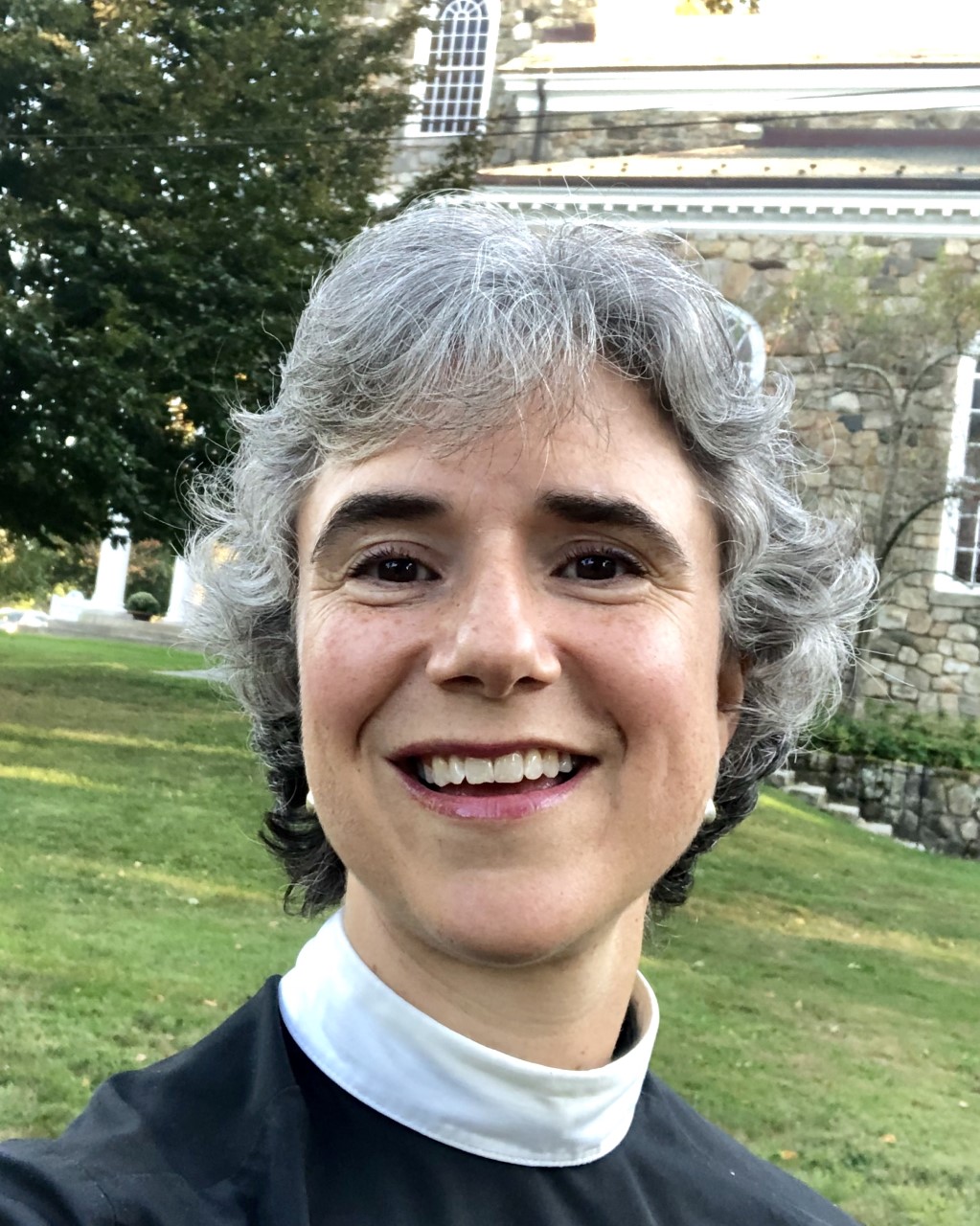
Rev. Whitney Altopp
FORUM ON FAITH
Reflections on the significance of an Episcopal priest regarding women's ordination.
by Rev. Whitney Altopp
Published: November 6, 2021
Danbury News Times
I'm just barely older than women's ordination to the priesthood in the Episcopal Church. As a priest myself, I know how hard it is to lead a faithful community through change. This last year has brought to my attention that changing social practices is hard work. Often theology grows up around social practices rooting them even deeper in our common life.
In preparation for All Saint's Day (November 1) I took a few minutes to get to know people in Episcopal Church history whose names are unfamiliar to me. All Saint's Day is about remembering the faithful people who have gone before us. We remember them because they remind us of the greatness of God; they demonstrated with their lives what it means to love God with all your being and love your neighbor as yourself.
Although the Episcopal Church does have a Calendar of Saints, the calendar is hardly all-encompassing. Furthermore, our definition and requirements for sainthood are different than the Roman Catholics. For example, we don't require a certain number miracles. So, when I talk about saints, I recognize the small liberties I am taking in determining a person's sainthood.
The Rev. Paul Washington (1921-2002) is someone that I want everyone to know about because his life directly affected mine. He was a priest and civil rights activist in Philadelphia. He served as Rector (head pastor) at Church of the Advocate from 1962-1987. For 25 years he dedicated himself to ministry among the marginalized of Philadelphia, working for transformative justice.
This was remarkable because Washington had grown up in a middle class, educated household in South Carolina. The privileges with which he was born, along with his hard work, set him on a path for stability and comfort. But Washington had experienced the radical love of Jesus, made known in the power of Jesus' Resurrection, and felt called to be a maker of peace by being an advocate for justice. The Church of the Advocate proved to be a perfect place for this service.
He was quoted in www.episcopalarchives.org/church-awakens/about
"I decided to give myself--my soul, my time, my resources--to everyone who came to see me. Every person was Christ: 'Inasmuch as you have done it unto one of the least of these,' Jesus said, 'you have done it unto me.' So I instructed my family:' 'When someone rings the doorbell and asks to see me, don't come to tell me and describe him--clean or dirty, drunk or sober, white or black. Just tell me, 'Someone is at the door to see you.'"
This spiritual conviction and groundedness is what fueled his willingness to enter into the hard places, creating a space for people to try to make the world a better place. A student organizer working with gangs asked Washington if The Advocate might be a place for outreach with the community. Washington, after some hesitation, agreed. Doing the radical work of The Gospel of Jesus Christ meant that authorities might get upset because he was relating to the "least of these." But what else did the Gospel call Christians to do?
Washington continued to grow in his capacity to make space for God's grace to be made known. On July 29, 1976, the Feast of Saints Mary and Martha, Washington and The Advocate hosted the first ordination of women to the priesthood. It was considered an "irregular" ordination since Women's Ordination had not yet been approved by the larger church. The women who were ordained priests, amidst supporters, protestors, and threats, were known as The Philadelphia Eleven.
The Rev. Paul Washington's willingness to enter into the troubled areas and find God's presence there continued to make possible things that people thought were impossible. "The impossible made possible through God's grace" sounds like a miracle to me. I thank God for saints like Paul Washington, whose intimate experience of the Grace of God cleared the path for my ministry, allowing the Episcopal Church to see God's grace in me, ordaining me to share God's grace with others.
The Rev. Whitney Altopp, Rector, St. Stephen's Episcopal Church, 353 Main St.,Ridgefield, CT 06877. She can be reached at: 203-438-3789 or waltopp@ststephens-ridgefield.org
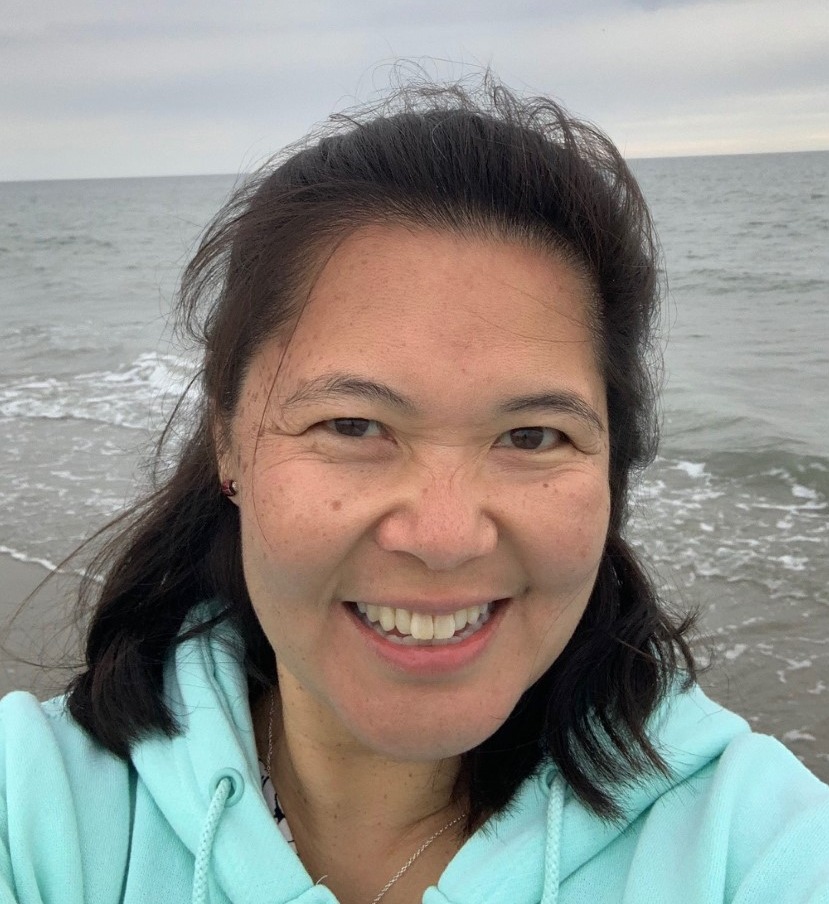
Stephanie Shaughnessy
FORUM ON FAITH
When Grieving, It's OK To Be Still.
by Stephanie Shaughnessy
Published: October 16, 2021
Danbury News Times
"Be still, and know that [He is] God." This meditation, from Streams in the Desert by L. B. Cowman with updates by Jim Reimann, is a part of a daily reading that helps to ground my faith and inform the work I do with bereavement support groups. After sharing this with the group, one of the members stated, "I can do that. I can be still. I don't think I can do much else but I can be still."
Many times, individuals come to bereavement groups seeking the magic potion to cure their beleaguered feelings. They want to not feel sad anymore. Everyone's journey is different. Some people's journey to emotional acceptance/wellbeing may be very quick. For others, it may last a lifetime. Over time it will get easier. Isaiah 41:10 reminds us, "Fear not, for I am with you; be not dismayed, for I am your God; I will strengthen you, I will help you, I will uphold you with my righteous right hand." God will always be there for us. If you have experienced a long or deep relationship, the memories, the love and the essence of the person are not going to just fade away.
Grieving individuals do not just get over a loss. It is work to process the loss, hard work. We encourage people to give themselves permission to grieve. They need to be kind to themselves. Unfortunately, society doesn't always give people time. Generally, people are allowed to grieve for a week to two. Then they are expected to get back to school, work and life in general. If feelings of depression or grief last longer the recommendation is to see a counselor, pastor or a trusted person who can assist. Certainly, these are important and useful recommendations. However, I question, "Why can't grieving people just be still? As a society shouldn't we be as accepting of grief and depression as any other emotion? Why does it make everyone feel so uncomfortable to talk about death?" It is in talking and sharing that grieving individuals are able to move forward.
In bereavement groups people are provided with skills and supportive measures they might find helpful in processing their grief. Some of which are common but some may surprise you. A senior high school student who was doing their experiential project at our agency suggested - writing a letter to the person who died. Many of the articles have suggested this along with journaling. However, the student then suggested a step further. Upon completion of writing the letter, read it aloud to someone. Reading aloud can be a cathartic experience. Most importantly, allows the reader to more fully experience and express their feelings.
When grieving, it is important to care for yourself. Give yourself permission to be sad, cry and be angry. It's okay to take time out for yourself. Matthew 11:28-30 serves as a good reminder to self-care. "Come to me, all who labor and are heavy laden, and I will give you rest. Take my yoke upon you, and learn from me, for I am gentle and lowly in heart, and you will find rest for your souls. For my yoke is easy, and my burden is light." Allow others to help you take care of yourself physically by eating a well-balanced diet, exercising, and not drinking too much. Alcohol may assist in dulling pain, but you do not want to bury your feelings. It's also important to get adequate rest. You also want to allow yourself to feel the pain. Facing the pain will assist you in moving forward.
It's also important to remember the benefits of humor and laughter. Psalm 30:11 says, "You have turned my mourning into joyful dancing. You have taken away my clothes of mourning and clothed me with joy." Laughter strengthens our immune system, lowers blood pressure, and improves alertness. It also increases endorphin levels, promotes resilience, and just makes it easier to cope with difficult situations. Mark Liebenow, a nature and grief writer, states in his blog, updated May 22, 2017 - "Laughter and Grief- grief takes us to a place where we honor our dead. Laughter helps us reclaim the goodness of their love. It also opens our hearts to each other."
These are only a few suggestions and topics that are discussed in a bereavement group.
For anyone dealing with a recent death, there can be a need to celebrate getting through each minute in a day. That's okay and if the only thing you can handle is being still, let yourself know that this is okay as well. "When you become weak through the fierce fires of affliction, do not try to "be strong." Just "be still and know that [He is] God." And know that he will sustain you and bring you through the fire."
Stephanie Shaughnessy, MSW, Volunteer and Bereavement Services Coordinator at Visiting Nurse and Hospice of Fairfield County and a member of Congregational Church of New Fairfield, UCC.
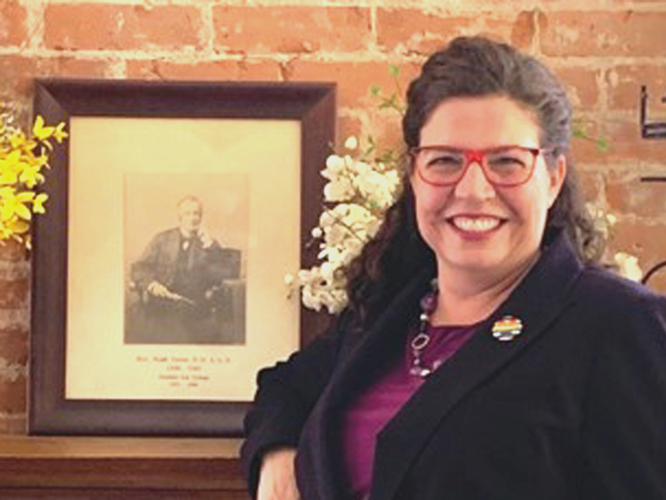
Rev. Amy Carter
FORUM ON FAITH
What we learn from the failings of a New Milford slave owner.
by Rev. Amy Carter
Published: October 2, 2021
Danbury News Times
"Our faith is over 2000 years old; our thinking is not." This saying is one of the ways that the United Church of Christ proclaims out particular pride in a history of learning from the past and adapting to the present. As I arrived in June as the Pastor of the First Congregational Church in New Milford, I stood on the historic green in the shadow of the steeple and wondered about the faithful people who were here for hundreds of years. How did their thinking impact society?
I suspected that like the history of most enduring institutions, time would likely
reveal a legacy of positive and negative impacts. Reflecting honestly on centuries of activities
through current understandings about racism, sexism, and economic inequality is difficult work, but
the central tenet of Jesus' teachings to love your neighbor requires it.
Looking afresh at old stories and questioning them critically can admittedly make some people uncomfortable. My faith tradition has been invaluable in this area because it has taught me to look at the most ancient stories of the Bible and ask questions about what is happening and why. Who recorded the story? What do we know about the norms of the society where it happened? How do we draw parallels to events happening today so that we might live in ways that love and care for one another?
Using a similar method, the New Milford Historical Society is preparing an exhibit on Black Lives in New Milford which is due to open in November 2021. Their search for records of the some of the oldest black lives in our community brought them to the First Congregational Church. Specifically, the historian was seeking possible burial records of a man called Primus.
Primus had been enslaved to Daniel Boardman, the church's first settled Pastor. I learned that Primus lived independently across the Housatonic on a plot of land he farmed, and he was baptized in the 1730s. Each time I cross the Boardman Bridge toward Route 7, I ask myself to imagine what his life was like. How did he live? Who did he love? Where did he find happiness? What was his relationship with Boardman like?
Perhaps these questions seem far off and irrelevant at first glance. Afterall, what difference can it make today? Obviously in the intervening years sweeping changes have brought about a society and a church that proclaim equality for all. Yet we are still as a society struggling to achieve that ideal of equality. The demon of racism looks different today, but the harm it causes continues.
I am intrigued to learn what facts this research might uncover about Primus and the other lives of people of color that the Historical Society is profiling because I firmly believe that stories have the power to change our thinking. When we engage in the story, we have an opportunity to imagine how each person might have made decisions and how we could learn from their mistakes and do better.
Engaging an old story can be easier than a new one, but it is important to also take the step to ask how this story can teach us about how we live today. In the case of a public figure like Boardman, it is a rich illustration of the complexity of life. He was a man who certainly intended to follow the commandment to love his neighbor and did much good, but he also failed to recognize the full humanity of Primus.
Each of us is likely similar to Boardman in that we intend to do good, but we fall short. Perhaps like Boardman there are instances when this is a result of the common thinking that prevails during our lives. Maybe we lack the perspective to be able to see the fullness of our actions the way that history will, however we have more resources with which to try than have ever been available.
The 2020 Census tells us that the demographics of New Milford are changing. People of color will make up an ever-increasing portion of our population, and the topic of racism will continue to be in the forefront of life here. I cannot know how history will judge us, but I am certain that hearing the stories of our neighbors is key to both loving them and being faithful followers of Jesus.
Rev. Amy Carter, Pastor First Congregational Church, United Church of Christ, 36 Main St, New Milford CT 06776. She can be reached at revcarter@nmchurch.org.
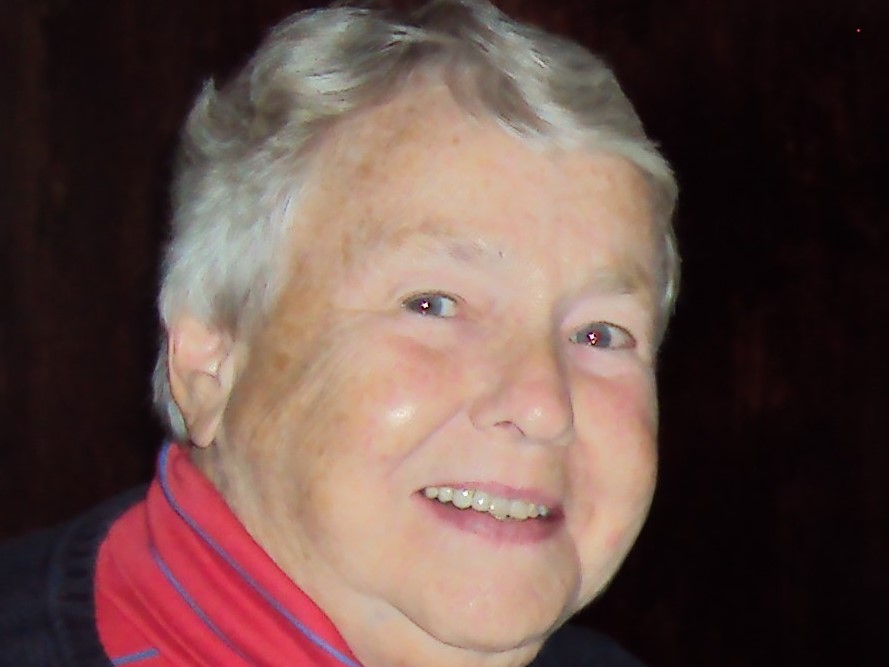
Sister Jeanne
FORUM ON FAITH
The meaning behind praying the rosary.
by Sister Jeanne
Published: September 18, 2021
Danbury News Times
The rosary, a favorite devotional prayer of many Catholics throughout the world, goes back to the 13th century. It was in the 1500s that Pope Pius V designated the original fifteen mysteries of the rosary, as prayed by Catholics today. He also designated October 7 as the feast of Our Lady of the Rosary and, the month of October is dedicated to Our Lady of the Rosary.
What are these mysteries and why do we pray them within the rosary? These are not mysteries as we might think of the word but are happenings in the lives of Jesus and his blessed Mother, Mary, that sometimes defy reason.
These mysteries are divided into five each: the Joyful mysteries prayed on Monday and Saturday are: 1) the Annunciation by the angel announcing to Mary that she would be the Mother of Jesus, who is God. That is a mystery, "how can this be?" she said, but after she questioned and pondered the message, said "yes"; 2) the Visitation when Mary traveled a distance to visit her cousin, Elizabeth, and to share with her what she was told; 3) the Birth of Jesus-why we celebrate Christmas; 4) the Presentation of Jesus in the Temple, where he was dedicated to God per the Jewish custom; 5) Finding in the Temple. At the end of the Passover feast, when Jesus was twelve, he stayed behind to talk to the teachers. Each parent thought he was with the other and rushed back to find him there!
The Sorrowful mysteries, prayed on Tuesday and Friday are centered on the happenings at the end of Jesus' life, and are recalled during Holy Week in Lent. They are, Jesus' 1) Agony in the Garden; 2) Scourging (beating) at the Pillar; 3) Crowning with Thorns; 4) Carrying the Cross; (5) Crucifixion and Death.
The Glorious mysteries, prayed on Wednesday and Sunday, call on our Faith because they "defy reason". They are: 1) the Resurrection, which is why we celebrate Easter Sunday; 2) Jesus' ascension into heaven, celebrated in the Catholic church on Ascension Thursday, forty days after Easter; 3) the Coming of the Holy Spirit upon the Apostles; 4) the Assumption of Jesus' Mother, Mary, into heaven; 5) the Coronation of the Blessed Virgin Mary as Queen of heaven and earth, who intercedes for us.
In 2002 five Luminous mysteries were added: 1) the Baptism of Jesus in the River Jordan; 2) the Wedding Feast at Cana; 3) the Proclamation of the Kingdom;4) the Transfiguration; 5) the Institution of the Eucharist.
All of these mysteries are found the New Testament gospel readings. We hear them read on various Sundays in Catholic and Protestant churches.
The purpose of praying the rosary is to meditate, reflect, on each mystery - what does it mean? How does it relate to my life experiences, whether in times of joy, sorrow, challenges, concern for loved ones or to just find some peace? People say the rosary for different reasons, for someone who is ill, for those preparing their life's journey together, who requested prayers or to just be in solitude with Jesus.
When I was in high school, I would stop at my maternal grandparents on my walk home. Very often my grandmother would be sitting in her rocking chair praying her rosary. That made a lasting impression on me. During those years, there was also a small booklet called The Rosary Novena (nine days of prayer). This novena for a special intention was 27 days of praying the rosary of petition followed by 27 days of thanksgiving. After my younger siblings were put to bed and the house was quiet - no TV in those days - my mother would pray this novena with the accompanying prayer and rosary. In the back of the booklet were little boxes for each day to be checked off.
In 1949, early in my senior year of high school, I was "inspired" to ask my mother if I could borrow her novena booklet. Each morning I would stop in church, which was next to the school, to pray the rosary novena. I don't remember now what intention I was praying for, but it was during that year that I decided that, with my parents' approval, I wanted to become a Pittsburgh Sister of Mercy, which I did in September 1950. Was it by persevering through this rosary novena of 54 days that, somehow, God nudged my heart? I think so, and I am most grateful for that nudge!
Sister Jeanne Snyder, RSM, is a Sister of Mercy and can be reached at jeannesnyderrsm@gmail.com.
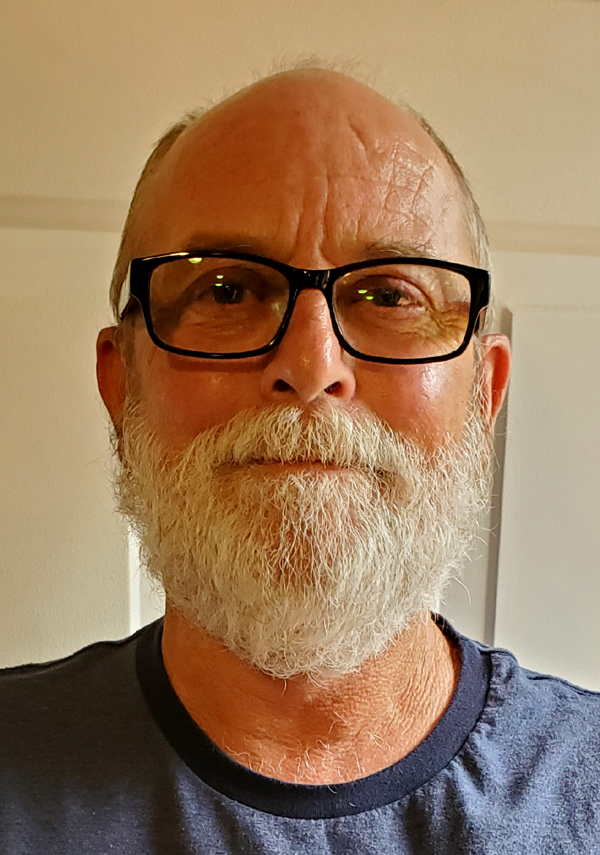
Mark Pierce
FORUM ON FAITH
What's learned through a Christian prison ministry program.
by Mark Pierce
Published: September 4, 2021
Danbury News Times
Mathew 25:36 . . . I was in prison and you visited me.
The program has three different missions: Kairos inside, where we work directly with residents over a course of three and half days, then meet monthly for Reunion Groups; Kairos outside to demonstrate God's love and grace to women who know someone who is incarcerated; and, Kairos Torch, a weekend mentoring program designed to introduce Christian concepts to incarcerated offenders ages 25 and under, followed by a six month one to one mentoring program.
I participate in the Kairos inside program. It took me many years to agree to go into the prison system. I was asked many times to volunteer by a good friend, and always answered no. Then one day, an email came inviting me to join a Kairos team, and I answered yes before realizing it. For me, It was God saying it was my time and I'm grateful I listened to that voice yelling in my ear.
Kairos team training is a commitment. We meet six Saturdays for 3-hour sessions and each meeting is important. We come together in prayer and fellowship, and we critique our weekend talks so they are ready for the residents. The entire weekend has a plan and a flow which works very effectively.
These talks are a key element of a Kairos weekend. After each topic, we discuss the subject as a group consisting of two team members and six to seven residents. The ability of residents to recite scripture from memory and the amount of Bible knowledge they have is amazing.
Topics include talks on choices, the Church, accepting God's grace and Christian action. All talks are written and given by Lay People. I have given the Choices talk, which is tough to write about, especially when addressing a room full of men who have made bad choices in life. These talks are not Sermons nor are they meant to be. They do not judge behaviors; they are structured to give insight into how to live a more Christian life, even in prison.
I get as much or more out of listening to these talks as the residents. It's the time where I really see the power of the Holy Spirit.
There is fellowship, singing and time spent getting to know and trust each other. Never before in a room full of men, have I really felt the power of total honesty. These men have dealt with trust issues most of their lives. They can size you up and know the true reasons you are there, very quickly. That is why our training is so important. We are trained to meet these men right where they are.
I was very surprised and not expecting the politeness, neatness and respect I received on my first visit.
We mainly work with lifers, men who are in for many years, and these men have had to learn to survive their prison sentence. How they do that time is up to them. Those who chose this program come away with a renewed hope in each other and themselves.
"What I learned in Kairos is that God doesn't hate me. He just hates my sins. The volunteers' taught me that he is a forgiving God no matter what." (Kairos Graduate)
I have come to believe that except for the circumstances of their upbringing, most of these men would not be incarcerated. They are a product of their violent upbringing, drugs, drive by shootings, robbery absent parents, etc...all the things that were most prevalent in their lives.
Through Kairos, we show them a better way to live through the love of Jesus Christ and his Father. We demonstrate that love of their fellow man by coming back after the weekends and having monthly reunion groups. By showing up they learn to trust us.
On my second team I had the most powerful moment as a Christian in my life. The residents and the team participate in a forgiveness ceremony where we write down all those who we have hurt or wronged and all those we need to forgive. We use rice paper, we are prayed over, then we put the paper in water and watch it dissolve just like our sins. When my turn came, I was overcome by the Holy Spirit, as the paper melted my years of anger and grief and lifted them right out of my heart.
I went in to serve the residents but received the most blessings! God spoke and I listened taking on a mission outside of my comfort zone which had enriched my faith.
Mark Pierce, Bethel United Methodist Church, Greenwood Ave., Bethel, CT 06801. He can be reached at Cb3gt@yahoo.com.
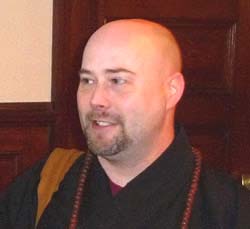
Ocean of Wisdom Sakya
FORUM ON FAITH
Learning About True Loving-Kindness.
by Ocean of Wisdom Sakya
Published: July 17, 2021
Danbury News Times
Over the last few weeks my colleagues in the Jewish, Muslim, and Christian traditions have given perspectives on what Jerusalem means to them.
Having the children of Abraham reflect on Jerusalem is an obvious choice, but Jerusalem, as is the case of any sacred space, can also have great meaning, and be inspirational to people outside of traditions proximal to it.
This is because all traditions are fingers pointing to the moon that is called the Sacred (Yahweh, God, Allah, Brahman, the Great Spirit). As Seyyed Hossein Nasr, an Islamic scholar has pointed out, the Sacred is like the Sun, which is too bright to look at directly, so we turn our heads and see the rays of the Sun, and those rays lead us back to the Sun, just as all traditions lead us back to the Sacred. With each tradition being suitable to different people, in different ways.
Indeed, one of my favorite bumper stickers is "God is too big to fit into one religion." The whole point of each religion is to provide a method for people to align with the Sacred, and to transform themselves.
As a Buddhist Priest I have found comfort and inspiration from other traditions. A friend named Rabbi Boxman once lent me a book called the "Jew in the Lotus." The book recounted the time when His Holiness the Dalai Lama invited Jewish clergy, from Orthodox to Reform, to his home to teach him about Judaism, and more importantly, to teach him how to maintain the Tibetan culture in exile. The Sacred helping the Sacred.
Later in life I would visit the tomb of Rumi, a Sufi (Muslim Mystic) in the Middle-East. While I communed with Rumi I read my favorite poem of his, "Only Breath," which emphasizes the unity of religions; there is no Jewish, Muslim, Hindu, or Buddhist breath - there is only the eternal breath of the Divine. It was quite an experience.
One of the most profound experiences of my life was my time in Assisi in Italy. Communing with St. Francis at his tomb, I was so inspired by the sacred energy there. I returned two more times. It felt as if St. Francis was speaking directly to you. I was surrounded by masses of Christian pilgrims, as I was with Muslims at Rumi's tomb, but I did not feel different, or excluded. Compassion, love, reverence . . . no religion has a monopoly on these things.
I am sure once I finally make it to Jerusalem, which is on the bucket list, that as I visit the Wailing Wall, the Church of the Holy Sepulcher, and the Dome of the Rock, that these experiences will be just as profound for me, regardless of my being Buddhist.
When one walks with the Sacred, the Sacred is revealed in every person, and thing, before them. And all the traditions teach this, and when one is aligned with the Sacred they see that each tradition is a method of uniting with the Sacred, rather than any method being right.
We have a sutra titled "The better way to catch a snake" that speaks to this. In it the Buddha says that religion, even Buddhism, is like a snake. You have to catch it with wisdom. You must grab the head of the snake. If you grab it by the tail, it can bite and kill you, and others. But if you catch it by the head, you are safe, and can use its venom to cure people who have already been bitten.
One of my favorite quotes from our tradition is, "If you see the Buddha on the road, kill him!" This is a warning to us not to attach our identity to our tradition, or to hold it as more valid, more sacred, than others. Or to use it to build up our ego, or to create a sense of self-importance, which are things that separate us from the Sacred.
The Sacred, regardless of the religious clothing it wears, and religious paraphernalia and rituals, calls us to be better. It calls us to create Heaven on Earth, or in Buddhism, what we call the Pure Land. To help us all become more compassionate and wise beings, and create a peaceful, divine space, for all.
Whether it is Bodhidharma's cave, or Jerusalem, the Sacred is present and beckoning us to be better. Dear brothers and sisters, I look forward to meeting you all in Jerusalem, or even at the temple we call the sidewalk.
Ven. Ocean-of-Wisdom Sakya, Abbot, Middle-Way Meditation Centers. venwisdom@gmail.com.

Ocean of Wisdom Sakya
FORUM ON FAITH
Learning About True Loving-Kindness.
by Ocean of Wisdom Sakya
Published: July 17, 2021
Danbury News Times
Over the last few weeks my colleagues in the Jewish, Muslim, and Christian traditions have given perspectives on what Jerusalem means to them.
Having the children of Abraham reflect on Jerusalem is an obvious choice, but Jerusalem, as is the case of any sacred space, can also have great meaning, and be inspirational to people outside of traditions proximal to it.
This is because all traditions are fingers pointing to the moon that is called the Sacred (Yahweh, God, Allah, Brahman, the Great Spirit). As Seyyed Hossein Nasr, an Islamic scholar has pointed out, the Sacred is like the Sun, which is too bright to look at directly, so we turn our heads and see the rays of the Sun, and those rays lead us back to the Sun, just as all traditions lead us back to the Sacred. With each tradition being suitable to different people, in different ways.
Indeed, one of my favorite bumper stickers is "God is too big to fit into one religion." The whole point of each religion is to provide a method for people to align with the Sacred, and to transform themselves.
As a Buddhist Priest I have found comfort and inspiration from other traditions. A friend named Rabbi Boxman once lent me a book called the "Jew in the Lotus." The book recounted the time when His Holiness the Dalai Lama invited Jewish clergy, from Orthodox to Reform, to his home to teach him about Judaism, and more importantly, to teach him how to maintain the Tibetan culture in exile. The Sacred helping the Sacred.
Later in life I would visit the tomb of Rumi, a Sufi (Muslim Mystic) in the Middle-East. While I communed with Rumi I read my favorite poem of his, "Only Breath," which emphasizes the unity of religions; there is no Jewish, Muslim, Hindu, or Buddhist breath - there is only the eternal breath of the Divine. It was quite an experience.
One of the most profound experiences of my life was my time in Assisi in Italy. Communing with St. Francis at his tomb, I was so inspired by the sacred energy there. I returned two more times. It felt as if St. Francis was speaking directly to you. I was surrounded by masses of Christian pilgrims, as I was with Muslims at Rumi's tomb, but I did not feel different, or excluded. Compassion, love, reverence . . . no religion has a monopoly on these things.
I am sure once I finally make it to Jerusalem, which is on the bucket list, that as I visit the Wailing Wall, the Church of the Holy Sepulcher, and the Dome of the Rock, that these experiences will be just as profound for me, regardless of my being Buddhist.
When one walks with the Sacred, the Sacred is revealed in every person, and thing, before them. And all the traditions teach this, and when one is aligned with the Sacred they see that each tradition is a method of uniting with the Sacred, rather than any method being right.
We have a sutra titled "The better way to catch a snake" that speaks to this. In it the Buddha says that religion, even Buddhism, is like a snake. You have to catch it with wisdom. You must grab the head of the snake. If you grab it by the tail, it can bite and kill you, and others. But if you catch it by the head, you are safe, and can use its venom to cure people who have already been bitten.
One of my favorite quotes from our tradition is, "If you see the Buddha on the road, kill him!" This is a warning to us not to attach our identity to our tradition, or to hold it as more valid, more sacred, than others. Or to use it to build up our ego, or to create a sense of self-importance, which are things that separate us from the Sacred.
The Sacred, regardless of the religious clothing it wears, and religious paraphernalia and rituals, calls us to be better. It calls us to create Heaven on Earth, or in Buddhism, what we call the Pure Land. To help us all become more compassionate and wise beings, and create a peaceful, divine space, for all.
Whether it is Bodhidharma's cave, or Jerusalem, the Sacred is present and beckoning us to be better. Dear brothers and sisters, I look forward to meeting you all in Jerusalem, or even at the temple we call the sidewalk.
Ven. Ocean-of-Wisdom Sakya, Abbot, Middle-Way Meditation Centers. venwisdom@gmail.com.
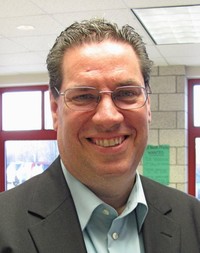
Rev. John P. Parille
FORUM ON FAITH
Why is Jerusalem Important to Christians?
by Rev. John P. Parille
Published: July 3, 2021
Danbury News Times
As a pastor who shares sermons every Sunday, Jerusalem is a topic that comes up in probably 80 percent of every message. Israel is also known as the "Holy Land" for Christians, including parts of Palestine. However, Jerusalem is a very special city because of its association with the birth, ministry, crucifixion, and resurrection of Jesus.
Christians regard Jesus as the Savior or Messiah so understandably Jerusalem would have a special meaning for those who follow Jesus. Because Jesus was Jewish himself, the connection to the history of this famous city provides deep history and heritage for the believer.
Jerusalem has become a major pilgrimage for Christians from all around the world. I visited the Holy Land just a few years back and, of course, the highlight of this trip was Jerusalem. Because of multiple conquests of the land by rivals, much of the original great city from the times of Jesus has been destroyed. However, there are many places that still stand that Jesus would have cast His eyes upon.
To be there and see these places that are discussed in the Gospels is hard to describe. The rich history from the Old Testament is ever present as well. Jews and Christians alike have studied many events and stories that show how important this city has been for thousands of years.
The entire life of Jesus has been connected to Jerusalem, beginning with Jesus' parents bringing him to be "presented" at the Temple. According to the Gospels, Jesus preached in the great city and performed many miracles of healing; even the great story of chasing out the money changers from the temple.
All of these events have great meaning for the Christian faith, so to be able to go and walk down the cobblestone streets and sit on steps that used to enter into the great temple, can be overwhelming and incredibly powerful as you can imagine Jesus being there.
As we read the scriptures, we find that Jerusalem has always been essential to Jesus, not only during his 3 years of ministry, but even in His last moments on earth. I was told that my preaching would never be the same after visiting Jerusalem, and I have found this to be true. To see this magnificent place, with so many cultures and religions coming together and the rich history that is there, its quite frankly hard to put into words. I have also found that any Christian, clergy or laity, have experienced the same emotions and feelings standing on this holy ground.
I had never traveled overseas and was a bit apprehensive going into the Middle East where there is a history of turmoil. A friend of mine told me this before I left, "You will find that you have a sense of being home while in Jerusalem." He was right. Never did I imagine that standing in the middle of a busy street in Jerusalem, with sights and sounds that cannot be found anywhere else in the world, I would feel at home.
I did not feel like a stranger or a tourist in Jerusalem; I could feel the presence of Jesus all around me. Somehow, I was home. It was an amazing visit and I now understand how important Jerusalem is to Christians. I also believe my friends from other faiths are feeling the same thing because of their religious beliefs when in this holy city.
Rev. John P. Parille, Senior Pastor, Bethel United Methodist Church, 141 Greenwood Ave, Bethel, CT. He can be reached at: pastorjohnparille@gmail.com.
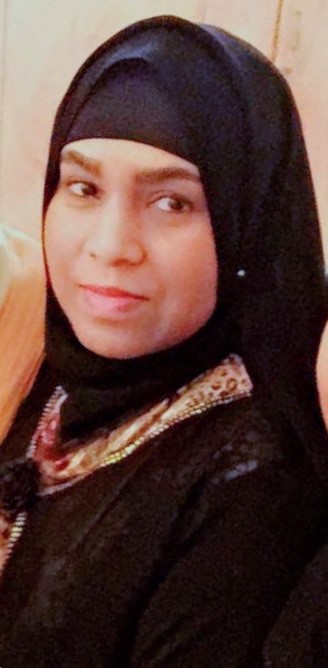
Shazeeda Khan
FORUM ON FAITH
How Jerusalem is 'indelibly connected' to Islam.
by Shazeeda Khan
Published: June 19, 2021
Danbury News Times
Islam's connection to Jerusalem is a sacred one based on the Principles of Islamic Belief. Among these are the belief in the oneness of God, divine guidance through His revealed Books and chosen Prophets (peace be upon all of them), divine judgment, and life after death.
This connection dates back to Prophet Adam who constructed the first two masjids (place of prostration/worship) dedicated for the sole purpose of worshiping One God. Prophet Muhammad taught that the first House of Worship was established in Makkah called Al-Kabba' and the second was established forty years later in Jerusalem, Masjid Al-Aqsa (which means "the farthest masjid").
Prophet Mohammad identified three holy sites in Islam - "Do not undertake a journey to visit any Masjid, except three: my Masjid (located in Madinah), Al-Kabba', and Masjid Al-Aqsa (where Prophet Muhammad lead all the prophets in prayer and ascended to the heavens)."
Of the three Abrahamic religions, Islam is unique for its inclusivity. Islam recognizes and includes all the divine Books and all the Prophets, among them are the Prophets of Judaism and Christianity. The Quran states: "Say (Muhammad), "We believe in God and in what was revealed to us; and what was revealed to Abraham, Ishmael, Isaac, Jacob, and the Descendants, and in what was given to Moses and Jesus, and to the prophets from their Lord. We make no distinction between any of them, and to Him we submit." The Quran mentions 25 prophets by name and absolved them of all immoral charges leveled against them by previous communities.
Jerusalem is a land where the prophets walked and worshiped. It is indelibly connected to Islam and beloved to Muslims. It's a land where prophets ruled with justice. God said to Prophet David "We made you a ruler in the land, so judge between the people with justice, and do not follow desire, lest it diverts you from God's path . . ." Quran 38:26. Prophet Solomon prayed to God for sound wisdom and judgment that is pleasing to God: "My Lord, direct me to be thankful for the blessings you have bestowed upon me and my parents, and enable me to do good works that please You . . ." Quran 27:19.
Central to Islam is the concept of justice. It's a call to action to facilitate peace. Justice is a prerequisite for peace.
It is evident that the human condition abhors injustice. Injustice circumvents the unalienable rights endowed by our Creator which leads to inequalities, loss of life and loss of liberty. It is incumbent upon the party with the upper hand of power to be responsible, measured and to demonstrate just leadership where mercy, morals, and humanity prevail. The Quran states: "Believers! Stand firm for justice as witness for God even if it is against yourselves, your parents, or close relatives. Be they rich or poor, God is best to ensure their interests. Do not let your desires cause you to deviate from justice. If you distort the testimony or refuse to give it, then 'know' God is certainly All-Aware of what you do."
Muslims were blessed with leadership of Jerusalem during the reign of Caliphate of Umar Ibn Kitab when the Romans handed over the keys to him. Calipha Umar immediately began the revitalization of Jerusalem. Under his leadership, he demonstrated how Islam honored the People of the Book, the Jews and the Christians. The Temple Mount, known as Al-Aqsa Compound or Al-Haram Al-Sharif (The Noble Sanctuary) to Muslims, was being used by the Romans as a garbage dump to offend the Jews, who considered this site sacred too. Calipha Umar and his army personally cleaned the area. He built Masjid Al-Qabli and eventually the Dome of the Rock was added. Religious freedom for all faiths were protected under the Treaty of Umar.
Islam teaches that God said: "I have forbidden injustice for Myself and I have forbidden it among you, do not oppress one another." This corresponds to one of His ninety-nine names and attributes, Al-Adl, The Just. The Just would never approve of or give permission to one community to persecute another - this applies to everyone, everywhere. "Believers! stand firmly for God as witnesses to fair dealing, let not the hatred of others swerve you to wrong and depart from justice. Be just: that's next to Piety: be conscious of God, He is well-acquainted with all you do" Quran 5:8.
Jerusalem is important to the three Abrahamic religions. It is a land where peace must be established. This requires that morals, consciousness and justice prevail.
Shazeeda Khan is the Director of Islamic Education at Baitul Mukarram Masjid of Greater Danbury 330 Main Street, Danbury CT
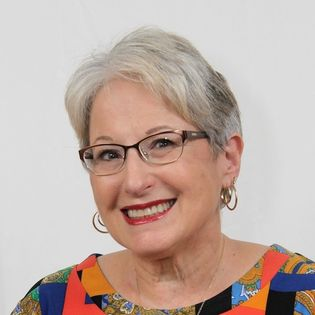
Cantor Penny Kessler
FORUM ON FAITH
What Jerusalem means to Jews?
by Cantor Penny Kessler
Published: June 5, 2021
Danbury News Times
In the hopes that we can all find it in our hearts to pray for peace for everyone who lives in Jerusalem, Israel, and the Palestinian Territories, for the next several weeks, the Forum on Faith will be featuring religious perspectives on the importance of Jerusalem in different faith communities,
How can I describe what Jerusalem is to Jews?
Jerusalem, the ir shalom, the City of Peace, is the Jewish spiritual and religious center and home. We face east towards Jerusalem when we pray, and we place beautiful ornaments called mizrachim on the eastern walls of our homes to orient ourselves towards Jerusalem. We pray for the peace and well-being of Jerusalem in every prayer service. Jerusalem appears 669 times in the Hebrew Bible.
Jerusalem is golden. Its buildings are made from a variety of pale limestones, and the buildings shimmer in the golden sunlight. To see Jerusalem from the distance is to see the glow of the entirety of Jewish history, to know that there has been a Jewish presence in Jerusalem for thousands of years. Jerusalem is the most magnificent place on earth. Especially on Friday evenings and Saturdays - the Jewish Sabbath - Jerusalem glimmers with restorative peace, calm, and hope.
Walking the streets of Jerusalem, especially in what we call the "Old City," is to be overwhelmed by the noises and the aromas of countless religions that coexist in Jerusalem. It's hearing the muezzins calling the times for prayer and the vendors haggling prices as they sell their wares in the shuks (markets) that line the main Jerusalem streets. It is breathing in the aroma of exotic spices, breads, and sweets, and arguing where the best falafel can be found. It's watching Jews shop on Thursdays for Shabbat and then scurry home on Friday as Shabbat begins. It's seeing Christian faithful pour into and out of the Church of the Holy Sepulchre, maintaining a peaceful coexistence for a thousand years. Jerusalem is where Muslims, Christians, and Jews try to find common ground.
It is witnessing the waving masses of Jewish men and women as they stand in front of the Western and Southern Walls that are the remnants of the 2nd Holy Temple. Standing at those Walls offers a visceral reminder that Jewish prayer started as priestly sacrifice. You can imagine the men and women standing there as they brought their offerings of animals, flour, or oil in the hopes of achieving atonement for their various transgressions or their praising or thanking God for the blessings in their life. I have stood at the Wall on Tisha b'Av, the saddest day of the Jewish calendar, remembering the Babylonian destruction of the 1st Temple and the horror of their desecrating that beautiful city. You are aware that the Temple will be rebuilt. You are reassured that while many Jews were exiled across the globe, many remained in the holy city. When we were denied the right to live there, we never stopped praying that we would be able to return.
As a Jew, Jerusalem to me is forever. Jerusalem is a dream of peace that remains waiting to be fulfilled.
Cantor Penny Kessler is a Spiritual Leader with the United Jewish Center in Danbury. She can be reached via email at cantor@unitedjewishcenter.org.
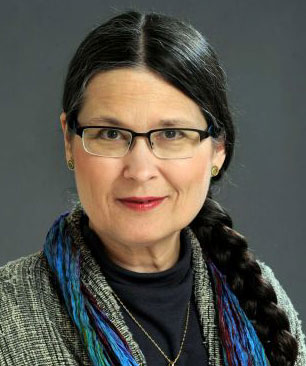
Rev. Bryn Smallwood-Garcia
FORUM ON FAITH
Church provides 'open and affirming' place for all in COVID and beyond.
by Rev. Bryn Smallwood-Garcia
Published: May 15, 2021
Danbury News Times
"It must have been a really hard year for you, Pastor, to not be working - you know, since all the churches have been closed for Covid." I heard him say it, and I knew he meant well, but our church - the Congregational Church of Brookfield - has never been closed. In fact, many of us have never worked harder over the past year to keep our ministries going!
During this pandemic year, our building has seen less use, but our worship and classes and service projects have continued. Groups for all ages quickly moved to live Zoom online last March, and we have recorded two worship services each week - one for adults and another just for children - which we post to YouTube and share on local access TV.
But what is a good Congregationalist to do when it's no longer safe to actually congregate? For many of us, the long months of not being able to gather together in our historic meetinghouse for worship has been a real loss that has affected both our spiritual life and our mental health.
We keep our in-person services brief, requiring masks and social distancing - but we have met most Sundays at 9:30am all year. Whether inside or outside we call them "prayer meetings" because we simply share prayer, story, instrumental music and scripture, as the CDC recommends not singing indoors yet, or sharing communion.
As the name "prayer meeting" indicates, one of the things it has always been safe to do is to pray for one another. I believe that prayer has power to change lives - both for the one requesting it and for those of us asked to pray for someone else. And some of the most moving prayers I've heard in our church have been for the healing of mental distress:
"Please pray for me as this weekend's time change is hard for me; I suffer from Seasonal Affective Disorder and I dread the darkness of winter."
"Please pray for my sister; she suffers from bipolar disorder and she is off of her medication and missing again. We fear for her safety."
"Please pray for my aunt and uncle as they grieve the death of my cousin; he lost a lifelong battle with depression as he died by suicide this past weekend."
As May 16th is Mental Health Awareness Sunday, we are particularly praying for those with mental health issues complicated by Covid-19. Also, as we remember the 16th anniversary of our vote to become what an "Open and Affirming" congregation of the United Church of Christ, we are hoping to learn to do better at welcoming those with mental illness, as well as those with intellectual or emotional disabilities.
We do this in order to heed the call of Jesus (in John 15:12) to "love one another, as I have loved you." Our "Open and Affirming" statement (adopted by a congregational vote on May 15, 2005 after years of church-wide study) is deeply rooted in scripture, so quotes from the Hebrew Bible frame it in both the first and last sentences:
"I will show love to those who were called unloved and to those who were called 'not-my-people' - I will say 'you are my people,' and they will answer 'you are our God.'" ~ Hosea 2:23
With the help of God's grace, we celebrate the total identity of all people created in the image of God. We continue to follow the call of Jesus to love God and neighbor by cherishing and honoring people regardless of sexual orientation, ethnicity, race, gender, age, economic status, physical, or mental ability.
We therefore actively welcome all to share in the full life and leadership, ministry, fellowship, worship, sacraments, responsibilities and blessings of participation in our congregation.
With God's guidance and love, we the people of the Congregational Church of Brookfield declare ourselves to be an Open and Affirming Congregation.
"to do justice, and to love kindness and to walk humbly with our God" ~ Micah 6:8
As people of faith, I believe our connection to God is powerful and important. But I also believe our connection to other human beings is also vital to our spiritual and mental health. Receiving unconditional love and affirmation for the person God created us to be can be a tremendous gift of healing that can feed the soul and strengthen us for the journey.
Rev. Bryn Smallwood-Garcia, Senior Pastor, The Congregational Church of Brookfield (UCC), 160 Whisconier Road, Brookfield, CT 06804. Bryn@uccb.org or 203-775-1259 or www.uccb.org
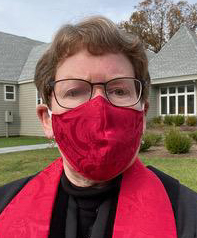
Rev. Jane Ellingwood
FORUM ON FAITH
Finding comfort outdoors amid COVID.
by Rev. Jane Ellingwood
Published: May 1, 2021
Danbury News Times
As a Christian minister who has also served as an interfaith hospital chaplain, I have had opportunities to meet with people from many walks of life as they or their family members have experienced illness, death, other losses or grief.
In our discussions, I've listened to or shared ideas about activities and spiritual practices that people have found helpful or which give them hope and even moments of joy during such times.
In light of other ministry work I do in the areas of eco-theology and creation care, I have been particularly inspired and touched by the ways people experience comfort, and the presence of God or the divine with them, when they are able to be outdoors or at least able to look outside, whether from their homes, hospital or hospice rooms, or other healthcare settings.
This was true before the COVID-19 pandemic began, and I shared suggestions with my chaplaincy cohort two years ago on conversations we might have with people if they expressed love or concern for nature or creation.
Then again, in late May of last year, when I thought, as others did, that the pandemic might be ending soon, I shared ideas with the congregation I am now serving about caring for God, creation, self, and other people both during the pandemic and in the anticipated post-pandemic times.
Now here we are, almost a whole year later.
For some people there's a feeling in the air or in our spirits that we are entering a time when the worst of the pandemic is behind us and many people have been vaccinated, at least in our part of the world.
Even so, none of us knows what lies ahead, and some people are experiencing new and ongoing illnesses, deaths, losses and grief.
In these days in which we are now living, I wanted to share a few ideas with you about how we might continue or begin to find more hope, comfort and inspiration, as we care for ourselves, other people, other creatures and the Earth.
I coined the phrase "we can bring the inside outside or the outside inside or both" to capture the simplicity and beauty of things people have told me they were doing or that I have done myself.
We can go outside, if we are able to. Many discovered it felt good to be outdoors or to get exercise last year, when it was one of the things we were permitted to do within the pandemic protocols. Even taking a short walk or sitting outside can be refreshing.
A lot of people have taken up new projects. Now that it;s spring again, we can feed the winter birds a little longer and get ready for hummingbirds; plant a garden outside or bring plants inside; gather collections of rocks, shells, sea glass, or other things we can bring inside for ourselves or give to others. Having something to care for or to hold on to can be soothing and restorative, inside or outside.
If we are inside, because of illness, jobs or school, grief, or other reasons, we might position ourselves where we can look out and see or feel the sun or fresh air. Some people, including me, feel less alone when we see birds, animals, and other creatures, and we may find comfort in seeing new life emerging around us.
If we are thinking about ways to honor loved ones who have died during the time that pandemic protocols did not allow for holding our traditional services, we could explore whether our faith traditions or beliefs would allow for other types of memorials now.
Some people are planning larger second memorial services to be held indoors, if they have already held a small outdoor (or indoor) service. I suggest that we could also create new rituals on the anniversary of the first service. Or we might donate towards planting trees or gardens, or maintaining parks or open spaces, to memorialize our loved ones and to offer other people places where they can experience comfort, hope, and the presence of God or the divine.
These are just a few possibilities of what we might do, depending on our traditions, hopes, and desires, as we seek to care for ourselves, others, and the world and as we continue our journeys through the pandemic period and beyond.
Rev. Dr. Jane Ellingwood is the interim associate minister at the First Congregational Church of Ridgefield at 103 Main St., Ridgefield, CT 06877. She can be contacted at JaneE@FirstCongregational.com or 203-512-5647.

Rev. Sierra-Marie Gerfao
FORUM ON FAITH
Reflections on Lent.
by Rev. Sierra-Marie Gerfao
Published: April 17, 2021
Danbury News Times
Before I had children, my fantasy of motherhood was the experience of a mother duck. My children would cutely follow along behind me as I introduced them to the world. Eventually, they would learn to get around, feed themselves and avoid dangers. The picture I had in mind was relatively tidy.
This is not to say that I did not have awareness of greater challenges I would have as a mother. I came from a relatively large family, and by the time I'd grown and gotten my license as a foster parent, I was working in a ministry for children, teens and families. But parenting is one of those things that is almost always messier than we imagine, no matter how experienced we are.
People are meaning-makers, and our children look to us for guidance as they make meaning. Naturally in the course of family life, we help them make sense of the world, find their place in it, and make their own contributions. We do this in the midst of life's messiness, its ups and downs, and the complications of our own limitations.
We help our children with meaning-making in all kinds of situations. When we encourage them to brush their teeth, we teach them they are worthy of self-care. When we take responsibility for our mistakes, we teach them about the importance of apologizing and making things right.
We help our children make meaning of the things they observe about the world when we explain racism, ableism, homophobia, or transphobia, and then give them tools to resist these forces. We help them make meaning when we teach them in a pandemic that one of our most important jobs is to care for one another. Our teaching begins as soon as our children are in our lives.
I remember once when one of my children was around nine months old, we were playing in a sandbox at a playground, and another mother and her 2-year-old came to join us. This mother and I sat together while the children played happily. Then suddenly, the 2-year-old reached over and intentionally hit my child on the head.
As I comforted my child, it occurred to me that thankfully he had never before experienced violence. This was his first encounter with the capacity of humans to cause one another pain. My job was not just to comfort him, but to restore his sense of safety in relationship to others. Even though he was just a baby, I was building a framework for meaning-making in light of the human capacities both to help and to harm.
Now the only children in my home are teens, and looking back, I think I did get to have something of the "mama duck experience" when they were younger. My children gave me a lot of opportunities to introduce them to the world. They looked to me to show them how to understand things. They asked me"why," "how," "when," "what" and "who?"
But unlike baby ducks, perhaps, my children weren't just looking to me for this meaning. My son learned something about his relationship with the world when at age 3 he picked out pink slippers at the store, and I bought them for him. He also learned something about his relationship with the world when he decided that even though in our family "pink is for everybody," he didn't want to wear his favorite pink slippers at preschool because not all families had the same perspective.
My son's decision to avoid doing something that could get him teased was part of his meaning-making, and if I hadn't realized it earlier, it would have been a great cue that I was going to need a community around me to help reinforce our family values, especially the countercultural ones.
That's one of the reasons we are part of a religious community, in our case a Unitarian Universalist one. Because people are makers of meaning, and meaning arises largely in community, it is really difficult to raise children without a community around us reinforcing positive values and helping our children find their place and make contributions.
With teens at home, even in a pandemic, it feels as if they look to me for very little. They are individuating. I am grateful to know that when they look outward, there is a community around them that knows and loves them and is at the ready to help guide them as they find their way in the world.
The Rev. Sierra-Marie Gerfao is the director of religious education at the Unitarian Universalist Congregation of Danbury, at 24 Clapboard Ridge Road, Danbury, CT 06811. She can be contacted at dre@uudanbury.org, or 781-605-8772.
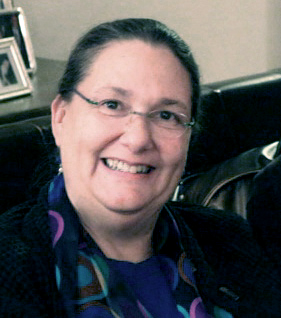
Polly Castor
FORUM ON FAITH
Reflections on Lent.
by Polly Castor
Published: April 3, 2021
Danbury News Times
Glorious spring blossoms are aroused from shriveled dormancy. Hungry bears awaken from hibernation, filling their quivering noses with fresh, warm breezes. Beautiful butterflies emerge from their transformational chrysalises, which they had previously thought of as their caterpillar graves. Chirping chicks peck their way out of the silent sepulchers of their egg shells, no longer entombed inside. Miraculously, life stirs, where just shortly before, it did not seem to be.
So even though I was brought up instead on chocolate bunnies and jelly beans, I have learned since what I think is the meaning of Easter - that Jesus came to show us that we live forever. Yes, I think that is a concise statement of his mission in a nutshell, but I've realized too, that for me, it is also so much more.
It is the inevitability that dawn comes after the darkest hour, which one can straightforwardly confirm, since it happens everyday. Metaphorically, though, this is huge. Whatever rough patch you are going through, it will not be forever. There is always hope. Jesus in the Easter story teaches me that daffodil days follow closely after a cold winter's blast.
Not so easy to contemplate is the part of the Easter message that suggests we can trust in God's care even in the face of whatever might be going on, no matter how horrible. It also seems to imply that I should find confidence in a future I can't see or comprehend. It seems clear to me that Jesus' example also exhibits selflessness paying huge dividends, regardless of how dubious that approach may appear on the surface.
It seems to me that Jesus' victory was achieved against all odds, so maybe ours can be as well. It is certainly beyond what I can know for sure, but apparently nothing is impossible. This is especially plausible if you define God as I do, as infinite, all-powerful, ever-present and good. With a God like that on your side, any needed overcoming feels not only possible, but inevitable.
Jesus' resurrection proves to me that God - as divine Life - mercifully overcomes death and can resuscitate me, as well, each time I feel unappreciated, unjustly blamed, under attack or entombed by hopelessness and dead-end prospects.
This also removes for me fear of the grave and replaces it with a larger sense of life than one confined in a material body. Identifying with my eternal spiritual self, instead of this limited material one, is very freeing. Life is not only precious, but because of Jesus' victory, I have reason to think it is more immense and profound than I thought before - everlasting, incorporeal and indestructible.
Jesus' exultant victory over his excruciating sacrifice shows me that immortality permanently annihilates death. This revelation emancipates me. It symbolizes for me hope refusing to be smothered or suppressed. It is evidence for me that any attempt to kill and bury the potency of spirituality simply fails.
I try to live in such a way that I make Jesus' triumph practical in my own life. I try to open myself up to God as often as possible, to have my own thought resurrected wherever and whenever it is closed off or seemingly defeated.
I have come to see that resurrection is actually spiritualization of thought - that glorious moment when realization, unconfined, bursts free and whole. I honor Jesus as the best example of this by spiritualizing my own thought as often as I can.
I always feel like today is the best day to commence that resurgence of life, which is always renewing and regenerative. So I also attempt to honor Jesus' triumph by liberating myself from every hate or obstacle and by doing my part to prevent evil from thwarting good.
Jesus has shown me how to live a life filled with purpose, vitality and adoration, which is of hourly (and not only seasonal) importance. I pray for more of that Christ consciousness that lives as Jesus did. Like Jesus, I endeavor to acknowledge the ever-present kingdom of heaven - which he said is both "at hand" and "within us," untouched by materiality, fear, and darkness.
Like Jesus, or the butterflies, the bears, or the daffodils, I try to be vibrantly resuscitated, rejuvenated, and reassured by my permanent coexistence with our Creator. I celebrate this promise springing forth.
Polly Castor, is a Christian Science practitioner, and member of First Church of Christ, Scientist, 260 Main Street, Ridgefield, Connecticut 06877. She can be reached at PollyCastor@gmail.com.
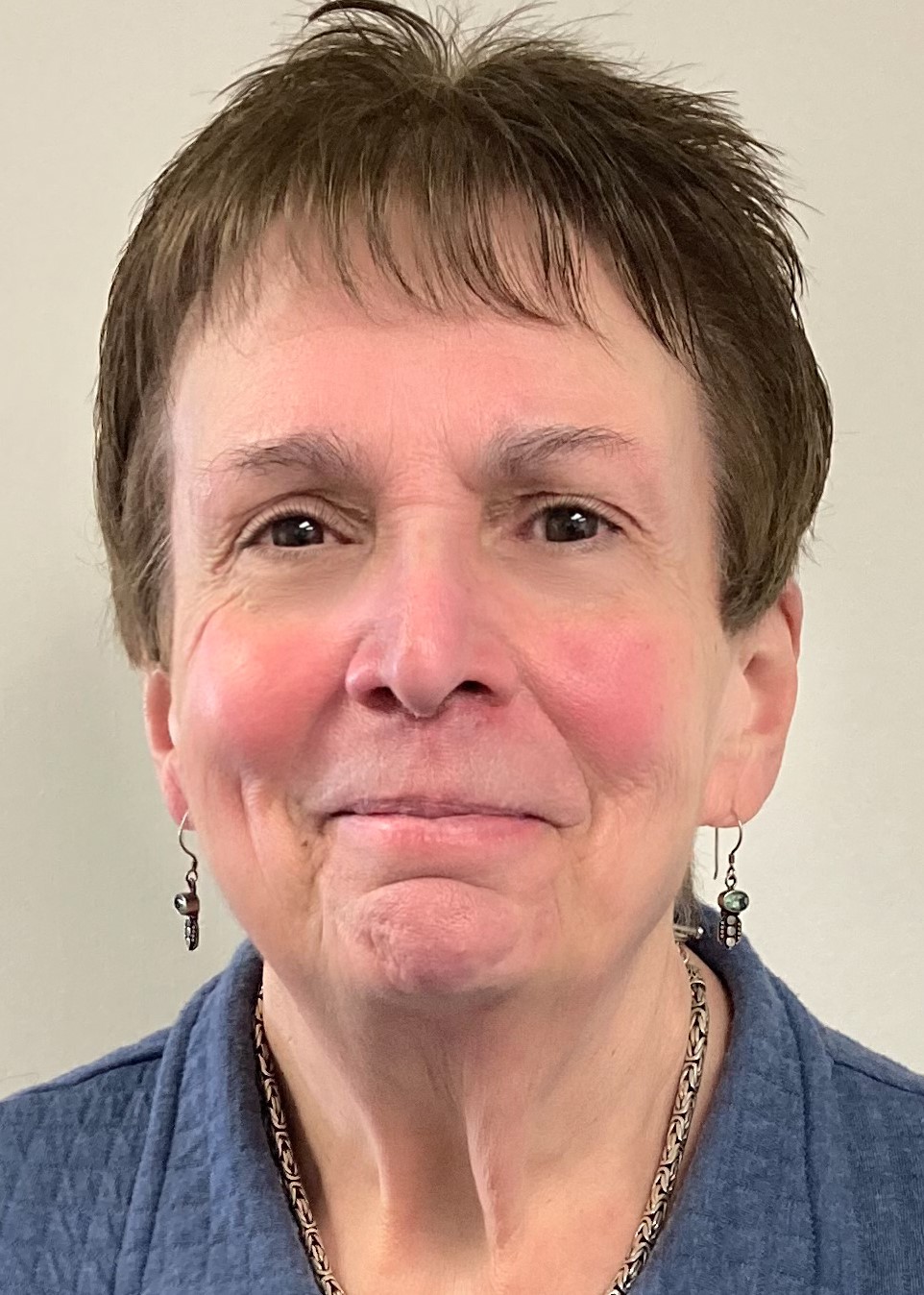
Jo Gabriele
FORUM ON FAITH
Reflections on Lent.
by Jo Gabriele
Published: March 20, 2021
Danbury News Times
As a Christian experiencing the season of Lent, I would describe it as a time of introspection, penitence, sorrow, prayer, hope and renewal. For me personally, it's a time to reflect on life choices I have made over the year, prayer and penitence for the choices that were questionable or hurtful, sorrow as we hear of and experience Christ's sacrifice for us, hope and renewal as Christians celebrate the resurrection.
Raised in the Catholic Church there were certain journeys I would experience during Lent. As a child, I simply viewed them as something I had to do, and it wasn't until becoming an adult that I came to understand the significance of them.
The first of these journeys was attending Stations of the Cross every Friday during Lent. Consisting of 14 stations, they represent Christ's journey to the cross. They begin with Jesus in the Garden of Gethsemane and end when his disciple Joseph, took Jesus' body from Pontius Pilot, wrapped it in clean linen and placed him is a tomb he had hewn from the rock, sealing the tomb with a stone. At each station, our priest would offer a prayer, participants would respond, we'd then kneel in silent prayer before moving on to the next station.
The second of these journeys was the visiting of churches on Holy (Maundy) Thursday. It was not something I understood nor when I asked the question of why, could anyone explain it. It was only after researching it as an adult, I found the purpose of visiting multiple churches.
Following the night of the Last Supper, the Blessed Sacrament is placed in repose, not to be offered again until after the death of Christ. Worshipers visit several churches as a form of penance and to pray in silent adoration.
My grandmother required us to visit a minimum of three churches. Research revealed that it may have originally started as a 7-tabernacle pilgrimage, however, regardless of the number of churches visited, focus was placed on the intent rather than the number.
Good Friday is the day we observed the death of Christ. Between the time of his death and resurrection, mass is not celebrated so communion hosts cannot be consecrated. If communion is distributed to the faithful on Good Friday, the hosts are required to have been consecrated previously since there is no mass held on that day.
On Good Friday, we would go to our parish at noon and sit in silent prayer until 3:00 p.m. symbolic of the hours it took for Christ to die on the cross. While we have attended stations of the cross, prayed, and kept company with the Blessed Sacrament, there is nothing that could prepare us for this day.
We would all kneel in silent prayer and one could almost feel the pain and agony Christ endured on the cross. The anticipation and anxiety would grow as the time of death approached and when it finally occurred, for me, there was an overwhelming sense of sorrow but also one of relief that his suffering had ended.
Holy Saturday follows, which is the last day of Holy Week and represents Christ's last day in the tomb and the Harrowing of Hell, the triumphant descent of Christ into the realm of the dead between the time of his Crucifixion and his Resurrection when he brought salvation to the righteous who had died since the beginning of the world.
In our home, it was a time of preparation for Easter Sunday, the end of fasting, and the celebration of the risen Christ. My paternal grandmother would spend all day in the kitchen preparing the food and confections we would consume. The food was also traditional to the season and I continue to bless our table with some of those traditions to this day.
Easter, or Resurrection Sunday was a day of celebration. We would gather around the table, give thanks for the risen Christ, and feast knowing that Christ died for our sins so that we may be rewarded with eternal life in his kingdom.
The religious and family traditions are a comfort to me as they represent the promise that when my time comes to leave this world, I will be reunited with those who have gone before me in the kingdom of Heaven, never again to be separated by time or space.
Jo Gabriele is a Program Assistant with The Association of Religious Communities. She can be reached at proassist@arcforpeace.org.
Bethel United Methodist Church
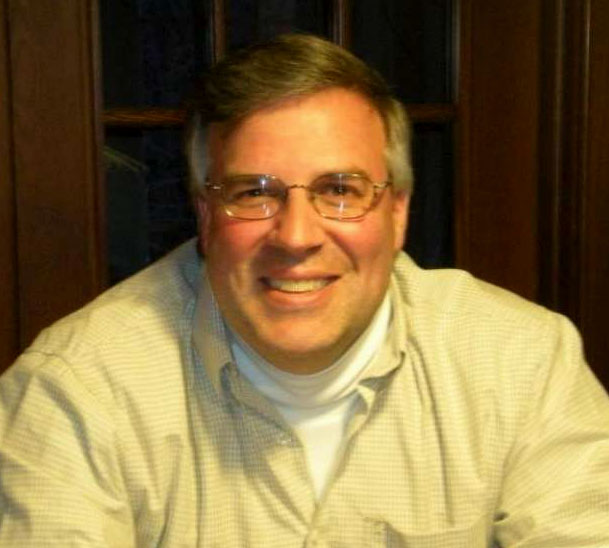
Paul Gervais
FORUM ON FAITH
The feeling of fulfillment from volunteering.
by Paul Gervais
Published: March 6, 2021
Danbury News Times
I was asked to write this article by someone I met, and got to know quite well, while volunteering for ARC (Association of Religious Communities). My first inclination was to decline since I am not a writer nor am I one to necessarily open up about my spiritual side / religion. I can't quote scripture, and to be honest, I am not as faithful at attending Sunday services as I should. But despite it all, I agreed to write this because I wanted to share how giving of my time has led to fulfilling me spiritually.
It was not until I was married and joined the First Congregational Church of Ridgefield that I began to understand the benefits received from volunteering one's time. That feeling of fulfillment and accomplishment you get when you have worked hard, and in so doing, you have made someone else happy; having brought joy to someone's life. While I had volunteered for various organizations in high school and college, I came to the conclusion that these experiences were different. The end goal of these projects certainly benefited others but, my takeaway back then was not so much how others benefited but, the good time I had had with friends working on the projects and having participated in a corporate sponsored project.
Over the past several years, I have become more aware of how the smallest of gestures can impact others and, for that matter, me. Whether cooking a meal for someone who is not feeling well or cooking a meal for a church event, to coordinating a fundraiser for mission outreach, each, big or small, contributes to the greater good.
While I have participated in many mission oriented projects, one project in particular which has had the greatest impact on me is volunteering for ARC's sponsored food pantry named "Comida" (Spanish for food) in Danbury. This amazing organization, through donations from area grocers, individuals, civic and religious organizations, affords the needy to come and pick-up food, at no cost, in a non-threatening and anonymous environment.
This amazing experience came about through my wife's desire to get my son more engaged in the community. Since my son, at the time, did not have his license, I agreed to also assist. Our role was simple, every other week pick-up food items, deliver them to ARC and set it up for distribution for the next day. A rather rote, certainly un-inspirational job you would think. But this role opened our eyes to so much more.
Over a number of weeks of pick-up and deliveries my son and I not only became more comfortable in our defined roles but, most importantly, we became more aware of the true need that existed (and continues to exist) in our local community.
While conversing with two instrumental members of the Comida Program, Jo Gabriele and Don Lavallee, as we went about unloading boxes and setting up the food items, we heard of the number of individuals this pantry served; of the amazing contributions made by community organizations and individuals and most importantly, we heard heartwarming stories of some of the families.
It's funny how we evolve as we get older. I guess there is truth in "with age comes wisdom". In an age of "it's all about me" I have gone down a completely opposite path. I believe it is more about others than myself. Being focused on my surroundings and the needs others I find fulfillment and peace. In my small way, I am working toward emulating Christ.
While I am not one to quote scripture, this particular passage from the gospel of Mark 10:45 inspires me: "For even the Son of Man did not come to be served, but to serve, and to give His life a ransom for many."
My journey toward being fulfilled spiritually really has come, and continues to come, from understanding the importance of giving back. When you are engaged you not only become part of the bigger picture; you get to witness the impact of your contribution. It may be as little as putting a smile a someone's face. While it may sound self-serving, you feel good / fulfilled. In the end, we are all in this together. In serving one another we are working towards the greater good; what God is asking us to do.
Paul Gervais, of First Congregational Church of Ridgefield, can be contacted at
paulgervais@sbcglobal.net or 914.319.0661.
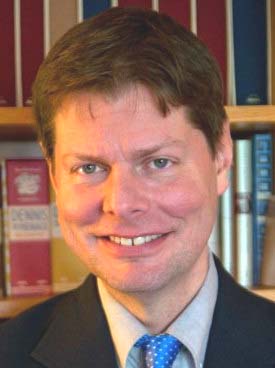
J. Michael Cobb
FORUM ON FAITH
What Lent means in 2021 .
by J. Michael Cobb
Published: February 20, 2021
Danbury News Times
We have just started the Christian season of Lent. This period has traditionally meant a time of study and preparation for those desiring to join the church, as well as a time of self-reflection for believers as they prepare for Easter, our most important holy day. Historically, the origins of Lent are influenced by forty days spent in the wilderness by Jesus, prior to the beginning of his earthly ministry. In the scripture frequently read near the beginning of Lent, we are told that immediately after Jesus had been baptized, he was "led up by the Spirit into the wilderness to be tempted by the Devil" (Matthew 4:1). During this time, his resolve and identity were called into question via demonic temptation. Once Jesus emerged from this time in the wilderness, he was prepared to begin his work.
Lent is a period of introspection. We prepare by engaging in reflection, starting with Ash Wednesday, when we consider our own mortality. We recognize that according to scripture we are formed from dust, and to dust we will one day return.
With that background out of the way, I want to consider what meaning any of this has for us in 2021. After all, haven't we just spent an entire year wrestling with a terrible pandemic? We do not need any reminders of our mortality, because we are confronting it every time we put on a mask and socially distance ourselves, every time we check the news or social media. For the last year, we have been doing nothing but confront our mortality.
Considering this ancient story struck me in a new way this year. The scripture says that Jesus came into the world with important work to do - but first he needed to confront some very personal demonic challenges. Only after dealing with these could he then focus on the work at hand.
For several years now, as a nation, we are starting to recognize the ways that racism, inequality, and all manner of injustice and exploitation of the vulnerable have gone on for generations. What does it mean to be in a season of confronting our own demons when we have been collectively making the attempt for years with little progress? For so many of us, our faith demands that we take up the work of healing and of working to bring about justice. Where to begin?
The Lenten experience teaches us that being disoriented and tempted are not things to be feared, but are rather integral parts of what it means to be human. In fact, being in the desert can lead to renewal and restoration. Being lost is a necessary precondition to being found. Knowing this intellectually, although important, doesn't change the fact that most of us want to avoid being disoriented and tempted. Most of us don't go into the wilderness willingly. This is true for individuals, and it is true for our institutions, from the church to our entire society. We generally know what must be done -but the will to act is something else entirely.
When confronting one's mortality is part of everyday life, it is helpful to come at it from a different angle. When attempting to confront decades or even centuries of injustice, it is crucial to find a way to get perspective on what can otherwise be overwhelming. I'm pretty sure that this approach is the answer to how we can experience Lent in 2021. The season starts in the cold of winter, and extends into the early days of spring - it doesn't last forever.
It is always good to consider the meaning of our lives, always good to think about ways to live in ways that promote justice. Just like a birthday or anniversary encourages us to pause and take stock, Lent offers a similar opportunity in our spiritual lives - a mystical check-up, if you will, taking place on the way to Easter, as big a celebration of new life as our tradition has to offer.
Lent is a Christian way of marking the changing calendar, certainly, but taking a moment to consider the larger picture is a universal human good. We all do this from time to time, and I see the wisdom in doing so as the outside world starts to thaw and the days become a little longer and a little warmer. It reminds us that this time of introspection will not last forever, and that spring is not far away.
We still have work to do, of course, but let this time of year be a reminder that we have come through much already. Pause for a moment, reflect on where we've been, and then let's keep going, working together towards a more just world.
Rev. J. Michael Cobb is pastor of the Rowayton United Methodist Church and a longtime Danbury resident. He can be reached at pastormichael@rowaytonumc.org.
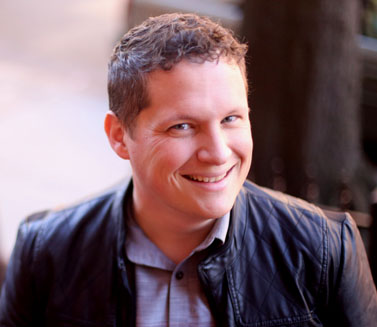
Jerry Phelps
FORUM ON FAITH
Music, Singing, and Community in a Global Pandemic.
by Jerry Phelps
Published: February 6, 2021
Danbury News Times
Every other Wednesday, my ritual had become such that I was fortunate enough to spend ninety minutes singing and teaching and learning music with the volunteer choir at the Unitarian Universalist Congregation of Danbury. As the music director at UUCD, I am the newbie to the group since I started in May 2019. Many of the singers and musicians have long been a part of this congregation and welcomed me with open arms and minds. Rehearsals were brimming over with singing and storytelling and laughing and frustration with new music and intricate harmonies and grappling with how to direct a choir and accompany them on piano simultaneously, all while attempting to ensure accurate pitches and appropriate style and diction for the song, not to mention lyrical interpretation and communication. Anyone who has ever made music or art understands how complex and tricky it can be. But, the camaraderie, friendship, and electric synergy we would achieve superseded any of the complexities.
Research has indicated many times over that when we sing together, we are healthier and happier. Really. Jacques Launay, a Postdoctoral Researcher in Experimental Psychology at the University of Oxford, states, "The physiological benefits of singing, and music more generally, have long been explored. Music makin exercises the brain as well as the body, but singing is particularly beneficial for improving breathing, posture, and muscle tension." Launay continues, "Improved mood probably in part comes directly from the release of positive neurochemicals such as ß-endorphin, dopamine and serotonin. It is also likely to be influenced by changes in our sense of social closeness with others."
Social closeness with others.
For the myriad reasons I love singing with others, I've once and for all learned that social closeness with others is precisely the reason I keep doing it. So much of what we do in a congregational setting is rooted in this idea of togetherness and community. When everything came to a screeching halt in mid-March 2020 as the COVID-19 global pandemic began to rear its ugly head in the United States, I felt entirely lost. How could we keep having services? What in the world am I going to do for the music? I'm the music director. I guess I'm supposed to know what to do? But, all of this was new and I certainly had never considered that we would ever not be together on Clapboard Ridge Road.
Enter Zoom. We, at UUCD, are incredibly fortunate to have a congregation with infinite gifts. One congregant and congregational leader had already spent many years running online events for many organizations through her own company, The Creter Group. She was much farther ahead of the game than any of us. She patiently taught us, rehearsed with us, problem solved sound issues, helped improve backgrounds and screen positioning, and provided an incredible level of technical support. That which felt impossible quickly became possible. We pivoted to services on Zoom and haven't stopped since.
Admittedly, at the beginning, I was not particularly optimistic about how I could ever attempt to lead a group of people in song without actually hearing any of them sing. But, somewhere along the way, it began to feel somewhat, dare I say, normal?
While I am hopeful that we are seeing a glimmer of light at the end of a never-ending tunnel, I have found "social closeness with others" through music to be one of the only things I can rely on during this bizarre time. Turns out, it was physical distancing more than social distancing. I've developed an even more profound gratitude for UUCD, its people, the music we make, and our commitment to remaining in community despite what has felt like impossible circumstances. As we near a full year of being unable to be together in the same space, I am longing for the day where I can hear their beautiful voices in harmony ring out through our halls. This will surely pass and when it is over, those voices are going to sound sweeter than they ever have before!
Jerry Phelps, Music Director, Unitarian Universalist Congregation of Danbury, 24 Clapboard Ridge Road, Danbury, CT 06811. musicdirector@uudanbury.org.
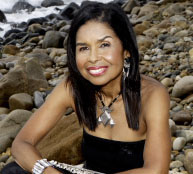
Sherry Winston
FORUM ON FAITH
Thank you God, I know that's you.
by Sherry Winston
Published: January 16, 2021
Danbury News Times
With this weekend's celebration of his 92nd birthday upon us, I remember and honor the amazing ife of a great theologian, orator, humanitarian and world leader, the Rev. Dr. Martin Luther King, Jr.
Dr. King and his father were co-ministers at Ebenezer Baptist Church in Atlanta, Georgia, until Dr. Martin Luther King, Jr. became pastor of the Dexter Avenue Baptist Church in Montgomery from 1954-1960. Dr. King was known nationally and internationally for his inspiring "I Have a Dream" speech, which he delivered at the Lincoln Memorial during the 1963 March on Washington for Jobs and Freedom.
The march attracted 250,00 people from across the country, which was the largest civil rights rally of the time. One of the memorable parts of his speech that resonated with me was his vision of seeing black and white men, Jews and Gentiles, Protestants and Catholics all join hands and sing together.
In 1955, Dr. King led the Montgomery bus boycott, which was said to be the most effective effort against racial segregation at that time. He became at this time the first president of the Southern Christian Leadership Conference, created by six black ministers to replicate the success of the Montgomery bus boycott. In 1964 Dr. King was awarded the Nobel Peace Prize for his tireless work for civil rights and racial justice.
Dr. King was only 39 years old when he was assassinated in 1968 and I can only imagine how his thoughtful and inspiring words could have influenced our moral compass today, and our hope for future peace and unity among all people.
When I reflect on the absolute faith that Dr. King possessed and his ability to stay the course against all odds, I think about my own faith and recognize God's daily influences on my life.
My faith was confirmed when, after many rejections from record companies, I was able to write, finance, and produce my first CD, "Do It For love." That was the turning point of my career, but more importantly it confirmed my belief in myself as an artist, and stimulated my inner resources to continue a life in music.
I had a similar experience when I wrote my first book, "For Lovers Only, A Cookbook And More." Despite many discouragements, my faith enabled me to complete a years-long project to produce a book, which was an expression of creative living.
Spiritually whenever I walk the colorful leaf strewn paths at Huntington Park, or hear the playful call and see the funny walk of geese at Lake Waramug, I smile and say to myself thank you God, I know that's You!
Standing on one of the tallest mountains in the world, I look out ready to take my first ski run for the day and I take in God's majestic work. I look at the frosty and snowy evergreen trees reminiscent of a winter wonderland, breath the crisp fresh air that wakes me up from my morning slumber, take in the white mountains as far as the eye can see. I say thank you God, I know that's You.
Whenever I dive the gorgeous and mysterious coral reefs of the South Pacific and Caribbean I see the beauty of the strangely colored sea creatures, marvel at my ability to breathe underwater, enjoy the camaraderie of fellow divers and say, thank you God, I know that's You.
We must all open our hearts and minds daily and recognize God's gifts all around us. The gifts are there, we just have to open ourselves up to God's blessings and recognize them. So the next time you hear a robin's call, a new born's cry, a child's laughter or the sound of your own heartbeat, smile and say thank you God, I know that's You.
Sherry Winston, Jazz Flutist, Recording and Performing Artist sherrywinstonband@gmail.com - 203-790-4111 - South Salem Presbyterian Church South Salem, N.Y.
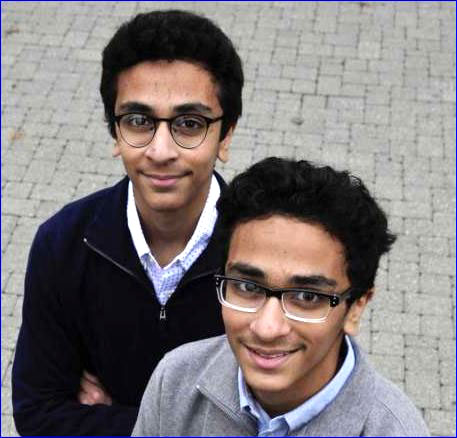
Adam & Ibrahim Bhavnagarwala
FORUM ON FAITH
Faith organizations can contribute to well-being, resilience.
by Adam & Ibrahim Bhavnagarwala
Published: January 2, 2021
Danbury News Times
Faith organizations in the region have contributed substantially to our collective well-being and resiliency during times of crisis. During the first weeks of the ongoing pandemic for example, faith communities banded together and provided a spiritual, financial and community-level support that could not have possibly come from anywhere else as early and with as much compassion at the grass-roots level.
These communities at Synagogues, Churches, Mosques & Temples organized food pantries, early support for households struck by COVID-19 and/or by loss of income, provided valuable medical guidance on COVID-19, used kits to make masks early and in volume for health care providers and worked to drive a genuine outreach across boundaries of faith, ethnicity, language and culture. Historically, faith-based community organizations across the country have also served Federal & State agencies (FEMA, CDC, DHHS to name a few) by providing community resources that generally help them prepare for and manage disasters and hazards at a local level.
To us, this spectacular display of brotherhood between faiths - for a common purpose driven by similar values of compassion and altruism is evidence our faith organizations can do much more - during times of crisis and during calmer times of normalcy. We can help by walking the bridges our faith organizations have already built and do not need a crisis to warrant their use.
Growing up in the region, three example experiences of faith organizations engaging with the community at large come to mind - reinforcing our optimism in the outcomes this partnership could bring.
Our first such experience, when we were 9, was at an Interfaith Peace Camp of the Association of Religious Communities (ARC) in Danbury. The camp included a very diverse group of children ages 8 to 11 and taught us what peace means in different world religions through multiple class room activities. We were thrilled at being given "Peacekeeper" awards (and free brightly colored t-shirts) by ARC. What struck us and stayed with us for a long time was that it was so easy to convince and show us then the commonality across the diversity of our beliefs. If this exercise was repeated at scale, we're convinced - the world would be much more at peace.
A different experience during our middle school years was one when we received early career guidance and support from volunteer professionals in our community. These parents zealously started a Math & Science Club and a Coding Club inviting youth across the region from different faiths and backgrounds to join in the clubs at our Mosque - The Hedaya Center, to prepare for and compete in Math and Science competitions at the local and national levels. The program had more youth from outside of our community than within over a period of 2 years creating a dynamic that built bridges and lasting relationships between students and between their parents. The positive energy in and around these career building exercises in Math, Science and Coding energized several of us enough to overcome together an otherwise intimidating prospect of learning Java, Python, Algorithms & Data structures. While this experience helped us prepare for and refine career choices, it also convinced us that Faith organizations have the integrity, commitment and wherewithal to deliver substantial benefits to the community at large in domains unrelated to expressions of faith.
A third experience was nothing like either of the above. In the words of the community at B'nai Israel and The Hedaya Center: "We create peace by doing it. . ."at the 'Kid's Kingdom' playground in the Brookfield Municipal Park - a joint-community picnic between families at the Hedaya Center and B'nai Israel where "Playing, reading, making a craft and eating together" was all we did! Charity begins at home, we were taught. World peace begins in your backyard when ordinary people reveal extraordinary opportunities, we learned.
Faith organizations are necessary for the things they do for their congregations. From our experiences, when they come together, they can accomplish a lot more for the communities outside and make the world a better place.
"O mankind! We created you from a single (pair) of a male and a female, and made you into nations and tribes, that ye may know each other (not that ye may despise each other). Verily the most honored of you in the sight of God is (he who is) the most righteous of you" - Qur'an Ch 49, Verse 13.
Adam Bhavnagarwala and his twin brother Ibrahim, Faith Community: Hedaya Islamic Center. Ibrahim@exasensetach.com and Adam@exasensetach.com.